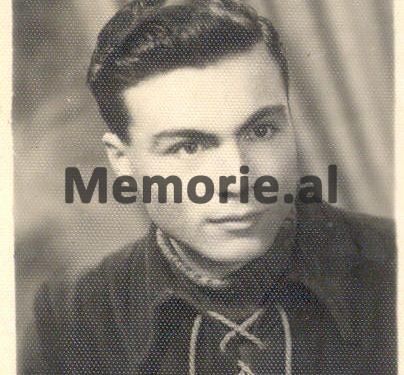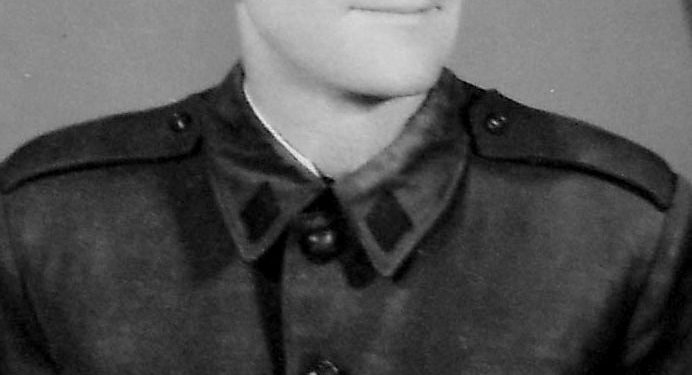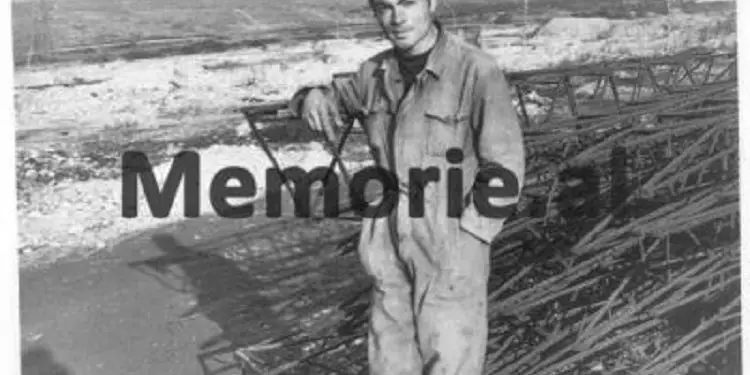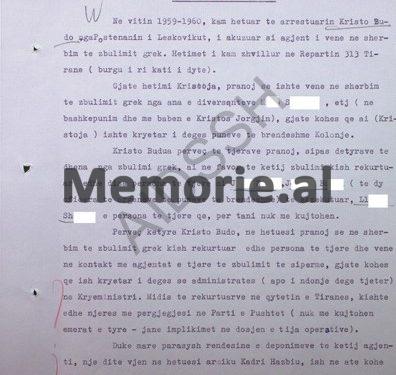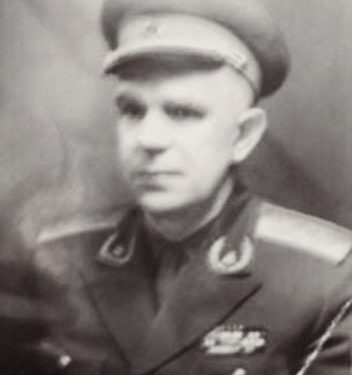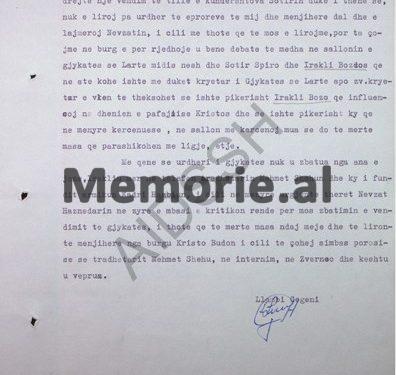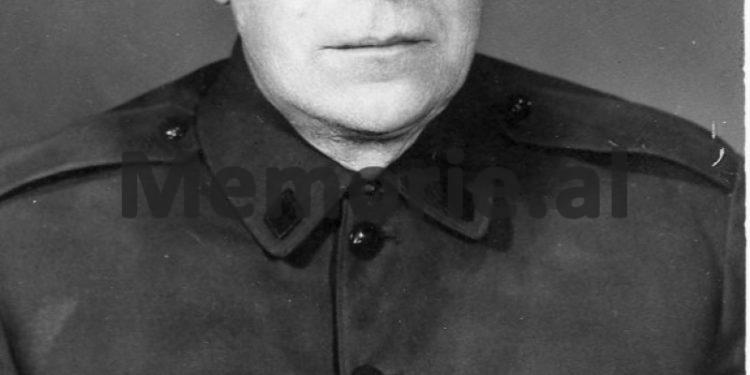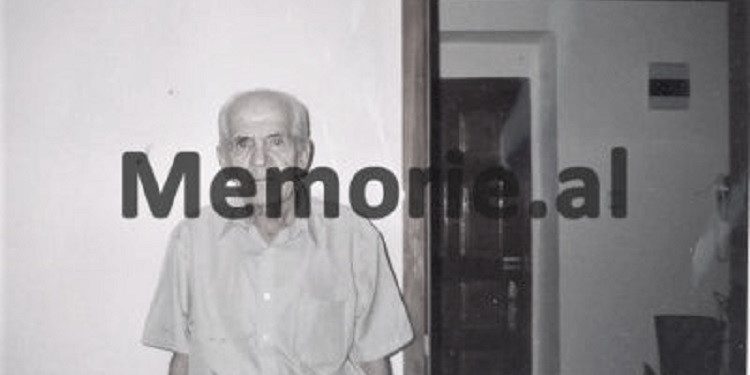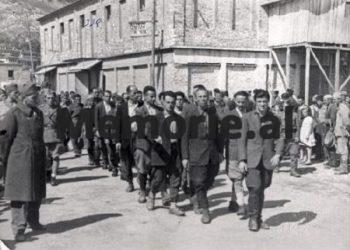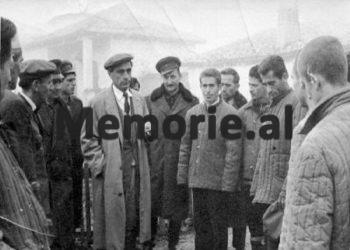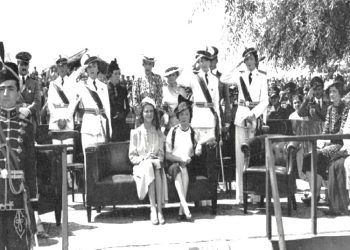By DASHNOR KALOÇI
Memorie.al / Tanush Kaso, a former political prisoner, now 91 years old, was one of the main leaders of the “Social-Democrat Group,” along with Pjetër Arbnori, Uran Kalakulla, and others, sentenced to 13 years in prison in 1961. During a testimony on the television show “Memorie” (November 2020), which addressed the crimes of communism, Kaso described his investigative process at the hands of the regime of Enver Hoxha and Ramiz Alia. He quotes his investigator, Llambi Gegeni, who, after seeing that Tanush was not accepting the charges, told him with cynicism: “Listen to this, young man, do not hold out hope for the court, because here with us (in the investigation office), the suit is cut, and there in court, they only put the buttons on, at the marks we have placed. Keep this in mind!” As Kaso explained, the message was clear: it was the State Security Investigation Department that determined the sentence, while the Prosecutor’s Office and the Courts were merely façades, implementing the Security’s verdicts almost word for word. This practice was a repeated testament and a well-known truth among the layer of former political prisoners who passed through the cells of that regime.
However, as this article will reveal, based on archival documents of the former State Security, this was only one side of the great evil. Researching the files of the same investigator, Llambi Gegeni, in other trials from 1960–’61, a unique and scandalous case is uncovered: even when the Supreme Court of the People’s Republic of Albania, chaired by Sotir Spiro, had ruled an accused person innocent (Kristo Budo, accused as a “Greek Intelligence agent”) – thus dismissing the prosecutor’s demand for the death penalty – investigator Gegeni refused to implement the decision for the defendant’s release in the courtroom. As the documents will testify, this act was a serious legal violation and a rare event, which, according to our research, was not repeated until the fall of the regime. Only the direct intervention of the then-Prime Minister, Mehmet Shehu, ordered Kadri Hazbiu not to release Budo (as the Court demanded) but to send him to internal exile on Zvërnec Island.
These events are recounted by Llambi Gegeni himself in an information report dated June 24, 1983, requested by the “Special Operative Group” during the investigation process against the “Hostile Group of Kadri Hazbiu and Feçor Shehu.” Although this report was written with the clear purpose of worsening the position of Kadri Hazbiu and Mehmet Shehu – as proof that they “had softened the class struggle” – this article confirms the veracity of the story by comparing it with the public testimonies of Kristo Budo and his personal archive. In this article, Memorie.al publishes for the first time secret declassified archival documents from the Archive of the Ministry of Internal Affairs (now part of the AIDSSH), including Llambi Gegeni’s information report, accompanied by the respective facsimiles and Kristo Budo’s testimony made public in 2004.
THE ARCHIVAL DOCUMENT, WHICH PROVIDES A SHORT BIOGRAPHY OF KRISTO BUDO, FROM THE HIGH DUTIES HE HELD FROM 1945 UNTIL HIS ARREST IN 1959 AND THE CHARGES AGAINST HIM AS A GREEK INTELLIGENCE AGENT, AND HIS SENTENCE OF INTERNAL EXILE AND IMPRISONMENT
CLARIFICATION
Following the implementation of the duties, on June 24, 1983, the former investigator of Kristo Budo’s case, Llambi Gegeni, was met and questioned regarding some important moments of this process, which took place in 1959-’60. Kristo Budo was an important cadre who, from the country’s liberation until he was targeted in 1959, held important functions. He served as Sector Head in the Kolonjë district, Deputy Chairman of the Executive Committee of the Fier District People’s Council, and in the Prime Minister’s Office, he covered the direction of Greek emigration.
In the Leskovik trial, he is implicated as a resident of Greek Intelligence, while before the war, as an agent of German Intelligence. Furthermore, in a trial at the Brick Factory in the Fier district, Kristo Budo is also implicated in sabotage by the defendants. This fact is also found in the History of the State Security Organs. Nevertheless, this enemy is not sentenced but only internally exiled to the Berat district. Around the years 1979-’80, Kristo Budo is targeted by the Berat Internal Affairs Branch as a Greek Intelligence agent, but is only convicted for agitation and propaganda. In December 1982, Kristo Budo benefited from the amnesty, being over 60 years old, and currently resides in the city of Berat.
Throughout his entire time, this enemy has been protected by the enemies Kadri Hazbiu and Feçor Shehu.
Operative Worker
Anesti Naçi
Note:
He can be asked if he knows anything about these enemies.
Hekuran Isai
THE SECRET INFORMATION REPORT OF INVESTIGATOR LLAMBI GEGENI, REGARDING THE INVESTIGATION PROCESS HE CONDUCTED AGAINST KRISTO BUDO IN 1960, AS WELL AS THE INCIDENT IN THE HIGH COURT, WHERE, AFTER THE ACQUITTAL, HE AND NEVZAT HAZNEDARI REFUSED TO RELEASE HIM
SECRET Copy No. 1
Tirana, 24.6.1983
INFORMATION
In 1959-1960, I investigated the arrested Kristo Budo, from Postenan of Leskovik, accused as an agent put in the service of Greek Intelligence. I conducted the investigation at Ward 313 Tirana (New Prison, second floor). During the investigation, Kristo admitted that he had been placed in the service of Greek Intelligence by the saboteurs M…S…etc., (in cooperation with Kristo’s father, Jorgji), during the time he (Kristo) was Chairman of the Internal Affairs Branch, Kolonjë. Kristo Budo, besides other things, admitted that according to the tasks given by Greek Intelligence, he had also recruited several other people in favor of this Intelligence, such as J. Z., J. B., (both officers of the Internal Affairs organs), who were executed, Ll. Sh., and other people I cannot recall now.
In addition to these, Kristo Budo admitted during the investigation that he had recruited other people in the service of Greek Intelligence and put them in contact with other agents of the aforementioned intelligence, during the time he was head of the Administration branch (or some other branch) in the Prime Minister’s Office. Among those recruited in the Tirana district were people with responsibility in the Party and in the Government (I do not recall their names – these implications are in his operative file).
Taking into account the importance of the depositions of this agent, one day the enemy Kadri Hazbiu, who was then Minister of Internal Affairs, came to the investigation office, and without my presence as the case investigator, he met (alone) with the aforementioned, and I do not know what conversation took place between them. I only know that on that day, or the next day when I took Kristo back into the investigation, the latter not only refused to say anything else (because he had more to say), but he rejected all previous depositions. In order to put him back in a position to confess, we requested Kadri Hazbiu to come again, but he not only did not come, but he also rejected our proposal to question people as witnesses, whom we deemed reasonable as it would not spoil the work and would confirm the accusation made. Finally, he was sent to trial on the charge of Treason against the Fatherland (Article 64 of the Penal Code), in the form of espionage.
We only had four witnesses, including J.Z., and J. B. (both had been executed earlier and we only had their implications), Thanas Thodhoraqi and one other person, all of whom accused him of being an agent of Greek Intelligence, and that he was the one who had recruited them in favor of the aforementioned Intelligence, to whom various information against our country, etc., had been given. The trial was held at the Supreme Court. Prosecutor Vangjel Kocani, Chairman of the judicial session, Sotir Spiro (deceased). Finally, the prosecutor demanded his sentence to death, while the chairman of the session, Sotir Spiro, (demanded the opposite of the prosecutor), acquittal and his immediate release from prison.
Since we had been told before Kristo went to trial (by one of the secretaries of the Supreme Court) that Kristo was expected to be acquitted, I informed Nevzat Haznedari, and the latter informed Kadri Hazbiu, who said: “If Sotir is at his end, let him issue such a decision; you just watch the trial proceed normally and do not interfere.” Based on the above warning, Nevzat Haznedari also came to the trial in addition to me, and after the court’s decision for acquittal was issued and I was ordered by Sotir Spiro to immediately release Kristo, without even taking him to prison, I considered such a decision unjust and objected to Sotir, telling him that I would not release him without the order of my superiors. I immediately went out and notified Nevzat, who told me not to release him, but to take him to prison.
Consequently, there were big debates in the Supreme Court salon between us and Sotir Spiro and Irakli Bozo, who at that time, I think, was the chairman or deputy chairman of the Supreme Court, and it is worth noting that it was precisely Irakli Bozo who influenced Kristo’s acquittal, and it was precisely he who, in a threatening manner, threatened me in the salon that he would take measures as provided by law, etc. Since the Court’s order was not implemented by us, Irakliu called the traitor Mehmet Shehu, and the latter called the enemy Kadri Hazbiu, who urgently summoned Nevzat Haznedari to his office and, after severely criticizing him for not implementing the Court’s decision, told him to take measures against me and immediately release Kristo Budo from prison, who was to be sent, according to the order of the traitor Mehmet Shehu, to internal exile in Zvërnec, and thus it was done.
Llambi Gegeni
Kristo Budo’s Testimony: “The tortures I endured in the presence of Kadri Hazbiu and how they sent me back to prison, even when the Supreme Court declared me innocent and ordered my release from the courtroom”
“In May 1959, when I was on duty in the Tropojë district, I was arrested by the State Security on the charge that ‘I was put in the service of the Greeks.’ I rejected the accusation and stated both in the investigation, during torture, and in the courtroom, that I had never betrayed the homeland. I requested verifications, as the accusations were untrue. I said this even before the Minister of Internal Affairs, Kadri Hazbiu, and even in a written letter. I said it also before Rexhep Kolli, Aranit Çela, Faik Minarolli, Nevzat Haznedari, Asaf Kondi, etc. I was held in the Investigation Office (cell) for two and a half years without being brought to trial, in violation of the laws in force.
During the time I was in the investigation, for months on end, I was subjected to the most inhumane tortures, which did not even happen during the time of the Inquisition. These tortures were inflicted upon me in the forests of Qafë-Kërrabë, and there they burned the flesh of my body with iron rods heated in the fire. There they pulled out all ten of my toenails, tearing them out one by one with great pain until I fainted. There I was beaten until I urinated blood and my legs and body were bruised black; there I was kept under torture all day and only brought back to the cell half-dead in the evening. In addition to the pain, I had to face the successive provocations of those Nevzat Haznedari placed in my cell, who remain the most despicable people I have ever known.
Nevzat Haznedari himself (Director of Investigation at the time), this cruel, heartless man and executioner, in whose conscience weigh so many crimes and persecutions that it is difficult to describe them all, participated in these tortures. It was this Nevzat who was harshly criticized for arbitrary violence during the time of Koçi Xoxe in 1948. And now, in 1960, this same Nevzat, in a more important post, was using the same methods of violence, even more severe ones, and instead of his hand being stopped, he was promoted to general for his ‘merits’?! The officers Asaf Kondi, Irfan Hoxha, etc., also participated in these anti-human tortures.
Meanwhile, the officer Hilmi Dume gave me injections so I wouldn’t die in their hands. In my presence, Kadri Hazbiu gave orders for torture. One day he told me: ‘I have an order to put you under torture.’ Who could order Kadri Hazbiu, other than Enver Hoxha and Mehmet Shehu, the two greatest dictators of our state?! As a participant in the National Liberation War and for revolutionary activity, I was also imprisoned and interned in the notorious camp of Prishtina, but I must confess that such tortures were not inflicted upon me even during the fascist occupation.”
Budo: My suicide attempt!
Such tortures were unbearable not only for humans but also for animals, so one day I decided to end my life by forcefully smashing my head against the cell wall. Two wounds opened, but the skull did not crack. Doctor Llambi Ziçishti was brought in to stitch the wounds. I was clear that the suicide attempt was punishable and a negative mark for me, but in the conditions I was in, I preferred death. That was salvation. All this and many other arbitrary physical and psychological actions were not enough, but Kadri Hazbiu and Nevzat Haznedari went so far as to bring out witnesses against me who had been sentenced to death, who, to save their own skin and incited by Haznedari, made all kinds of slander and untrue depositions.
The Investigation Process
I must state that three people from the Prosecutor’s Office dealt with my case: Aranit Çela, Prosecutor General, and his two deputies, Faik Minarolli and Vangjel Kocani. It is known that by law, the organs of the Prosecutor’s Office are charged with overseeing the investigation process and ensuring legality in investigations. But in my case, they did the opposite and implemented what the Investigation Office told them, to the detriment of the defendant and the truth. I am illustrating this statement with a few examples that concern only me and not others. It was Aranit Çela himself who, in his capacity as Prosecutor General, issued authorization after authorization for the extension of my process for two and a half years, without being brought to trial. The Penal Code did not allow this.
He was aware that the most inhumane physical tortures and violence in investigations, which were prohibited by law, were being used against me, but Aranit did not take any measures to stop them. The truth is that then and later, no punitive measures were taken against my torturers. In my letter of March 7, 1963, personally addressed to Aranit Çela, I also spoke about the tortures inflicted on me, but I never received a reply. It is a fact that his deputy, Faik Minarolli, got into the car together with Nevzat Haznedari when they took me to be tortured in the forests of Qafë-Kërrabë. So, this was the Prosecutor’s Office that oversaw the investigation process.
The Farce of My Trial
“The trial of my case has a history of its own. One day, before they brought me to trial, Nevzat Haznedari called me and said: ‘We will not give the letter you wrote to your family. You beg for mercy and say that; I am a veteran of the War and poor, etc.’ to act as Nevzat demanded would mean accepting faults I had never committed. I was tried by the Military College of the Supreme Court. The Judicial Panel consisted of Colonel Sotir Spiro (Chairman) and Lieutenant Colonel Rasim Bazo and Sami Kolaneci, members. The representative of the prosecution was Vangjel Kocani. The secretary was Vangjeli Terova, and the lawyer was Nexhmedin Shehu. Even before the trial, I did not accept the charge either wholly or partially and declared that I had never betrayed the homeland. I demanded that verifications be made, as the accusations were untrue. I also spoke there about the inhumane accusations made against me. Despite the prosecutor’s rejections, the judicial panel accepted my requests.
Thus, the Military College, after a long report which began on September 21, 1961, was repeated on October 2, 1961, and after returning my investigation file to the Security organs as irregular, setting a series of tasks for verifications, calling witnesses, including missing documents in the file, etc., on November 24, 1961, reached the final decision, declaring me innocent due to lack of evidence and ordering my immediate release from prison. My innocence was requested twice by my lawyer, whom I saw for the first time there in the courtroom, where I also gave him the indictment, as even that had not been given to him, let alone meeting with me in the cell during the investigation. Nevertheless, he defended me well, relying only on the court sessions, my depositions, those of the witnesses, and the documents brought to trial at my request.
What happened to me in the courtroom was truly an unheard-of and unprecedented scandal in the annals of judicial history. Immediately after the judicial panel left, in the presence of many people there in the hall, Major General Nevzat Haznedari entered, accompanied by a group of officers, and he ordered the sergeant to take me back to prison. The sergeant replied: ‘How can I take him to prison, General, he was acquitted’?! Nevzat told him: ‘I order you.’ Thus, following Haznedari’s order, they escorted me down the corridor to take me to the cell. There we ran into the court chairman, Sotir Spiro, who told the sergeant: ‘Where are you taking Kristo Budo, why have you tied him up, he has been acquitted’?! The poor sergeant, lowering his head, replied: ‘General Nevzat ordered me so.’
But could Nevzat Haznedari have carried out such an action on his own initiative?! Someone had ordered him to act that way, and I can confidently say that not even Kadri Hazbiu himself could have gone that far. Through that action, the State Security organs violated not only me but also the Supreme Court itself, letting some key Justice cadres who attended the beginning of my trial – such as Bilbil Klosi, Minister of Justice, Nedret Hoxha, Deputy Minister, Irakli Bozo, Frederik Nosi, Llazi Stratobërdha, etc. – understand that the State Security had ‘carte blanche’ from their very leader, Enver Hoxha, and no one dared to raise their voice or oppose these organs. Thus, instead of going to my family, they kept me in prison for another day, and the next day they internally exiled me for five years to Zvërnec Island. After five years, they arrested me again and sentenced me to 10 years of deprivation of liberty, which I served entirely in Ballsh prison. /Memorie.al




